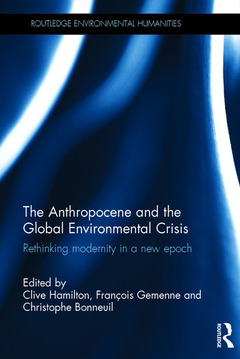The Anthropocene and the Global Environmental Crisis Rethinking modernity in a new epoch Routledge Environmental Humanities Series
Coordonnateurs : Hamilton Clive, Gemenne François, Bonneuil Christophe

The Anthropocene, in which humankind has become a geological force, is a major scientific proposal; but it also means that the conceptions of the natural and social worlds on which sociology, political science, history, law, economics and philosophy rest are called into question.
The Anthropocene and the Global Environmental Crisis captures some of the radical new thinking prompted by the arrival of the Anthropocene and opens up the social sciences and humanities to the profound meaning of the new geological epoch, the ?Age of Humans?. Drawing on the expertise of world-recognised scholars and thought-provoking intellectuals, the book explores the challenges and difficult questions posed by the convergence of geological and human history to the foundational ideas of modern social science.
If in the Anthropocene humans have become a force of nature, changing the functioning of the Earth system as volcanism and glacial cycles do, then it means the end of the idea of nature as no more than the inert backdrop to the drama of human affairs. It means the end of the ?social-only? understanding of human history and agency. These pillars of modernity are now destabilised. The scale and pace of the shifts occurring on Earth are beyond human experience and expose the anachronisms of ?Holocene thinking?. The book explores what kinds of narratives are emerging around the scientific idea of the new geological epoch, and what it means for the ?politics of unsustainability?.
1. Thinking the AnthropocenePart 1: The concept and its implications 2. The Geological Turn: Narratives of the Anthropocene 3. Human Destiny in the Anthropocene4. The Anthropocene and the Convergence of Histories 5. The Political Ecology of the Technocene: Uncovering ecologically unequal exchange in the world-system 6. Losing the Earth Knowingly: Six grammars of environmental reflexivity around 1800 Part 2: Catastrophism in the Anthropocene 7. Anthropocene, Catastrophism and Green Political Theory 8. Eschatology in the Anthropocene: From the chronos of deep time to the kairos of the age of humans 9. Green Eschatology Part 3: Rethinking politics 10. Back to the Holocene: A conceptual, and possibly practical, return to a nature not intended for humans 11. Accepting the Reality of Gaia: A fundamental shift? 12. Telling Friends from Foes in the Time of the Anthropocene 13. A Much-Needed Renewal of Environmentalism? Eco-politics in the Anthropocene14. The Anthropocene and Its Victims Epilogue 15. Commission on Planetary Ages Decision CC87966424/49: The Onomatophore of the Anthropocene
Clive Hamilton is Professor of Public Ethics at the Centre for Applied Philosophy and Public Ethics, Charles Sturt University in Canberra, Australia.
Christophe Bonneuil is a Senior researcher in History at the Centre A. Koyré (CNRS, EHESS and MNHN) Paris, France.
François Gemenne is a Research fellow at the University of Versailles Saint-Quentin-en-Yvelines (CEARC), France and at the University of Liège (CEDEM), Belgium.
Date de parution : 05-2015
15.6x23.4 cm
Disponible chez l'éditeur (délai d'approvisionnement : 14 jours).
Prix indicatif 154,17 €
Ajouter au panierDate de parution : 05-2015
15.6x23.4 cm
Disponible chez l'éditeur (délai d'approvisionnement : 14 jours).
Prix indicatif 58,78 €
Ajouter au panierThèmes de The Anthropocene and the Global Environmental Crisis :
Mots-clés :
Biodiversity; Climate Change; Conservation; ENVIRONMENTAL REFLEXIVITY; nature; meta-narrative; Hornborg; Bruno Latour; Environmental economics; Environmental policy; Environmental studies; Sustainability; Sustainable development; Christophe Bonneuil; François Gemenne; Dipesh Chakrabarty; Alf Hornborg; Jean-Baptiste Fressoz; Luc Semal; Michael Northcott; Yves Cochet; Virginie Maris; Isabelle Stengers; Ingolfur Blühdorn; Global Boundary Stratotype Section; Bronislaw Szerszynski; Techno Scientific Issue; Phanerozoic Aeon; Military Industrial University Complex; Strategic Positivism; Ages Of The Earth; Energy Resources; Environment Migration Nexus; General Purpose Money; UN; Unconventional Fossil Fuels; Sixth Mass Extinction; Earth System Science; Eco-political Discourse; Energy Descent; Great Acceleration; Siccar Point; LCD; Telluric Force; Green Political Thought; Anthropocene Narrative



